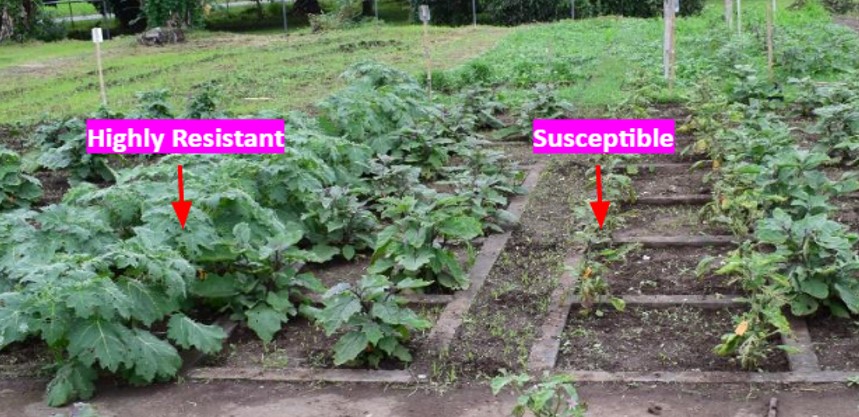
A government project, which aims to develop improved eggplant varieties resistant to eggplant fruit and shoot borer (EFSB) and leafhopper (LH), continues using innovative technologies.
Funded by the Philippine Council for Agriculture, Aquatic and Natural Research and Development of the Department of Science and Technology (DOST-PCAARRD), the five-year project, “Development of Improved Eggplant Varieties with New Plant Defense Genes for Multiple Insect Resistance using Innovative Technologies,” uses genomics, IT-based phenotyping platforms, molecular marker technologies, and new breeding techniques to fast-track this development.
Project leader Dr. Lourdes D. Taylo of the Institute of Plant Breeding, College of Agriculture and Food Science, University of the Philippines Los Baños (IPB-CAFS, UPLB) reported that the project is almost complete in its target to discover the natural defense mechanisms of wild eggplant accessions against EFSB and LH. Currently, they have mined and sequenced 10 genes and 10 promoters in two eggplant species, Solanum melongena and S. aethiopicum. Moreover, two new defense genes against insect herbivory were identified and 60 additional eggplant germplasm accessions with six simple-sequence repeat (SSR) markers were genotyped.
Field evaluations were also conducted to morphologically assess the resistance of 30 eggplant entries against EFSB and LH damage.
The EFSB Motion Tracking Software was also successfully developed by the team of Dr. Val Randolf M. Madrid of the Institute of Computer Science, College of Arts and Science (ICS-CAS), UPLB. The said software can detect the EFSB larva even when it is on top of an eggplant slice and can help track the feeding preference and larval movement of EFSB.
Currently, Dr. Taylo and her team are working on the initial breeding activities of the project. These include the selection of 20 accessions for the development of specialized mapping populations, the establishment of a direct organogenesis protocol, and the identification of target genes for CRISPR/Cas9 gene editing. These activities are necessary for developing the platform for gene-editing and gene function studies.

The project also characterized the Philippine populations of EFSB and LH using functional genomics. It mined single nucleotide polymorphisms (SNPs) and SSR markers from the genome and transcriptome sequences of EFSB and LH.
The improved eggplant varieties are expected to help eggplant farmers increase their income through higher yield, lower input costs, and enhanced product quality.
Dr. Rita P. Laude, professor emeritus of the Institute of Biological Sciences (IBS), CAS, UPLB headed the Technical Review and Evaluation Panel (TREP) and evaluated the project’s fourth-year accomplishments in an annual review conducted by the Crops Research Division (CRD) of DOST-PCAARRD.
Also present in the review are the UPLB project team, CRD Monitoring and Evaluation Section Head Renelle C. Yebron, ISP Manager for Vegetables Joel Norman R. Panganiban, and key staff from CRD.
